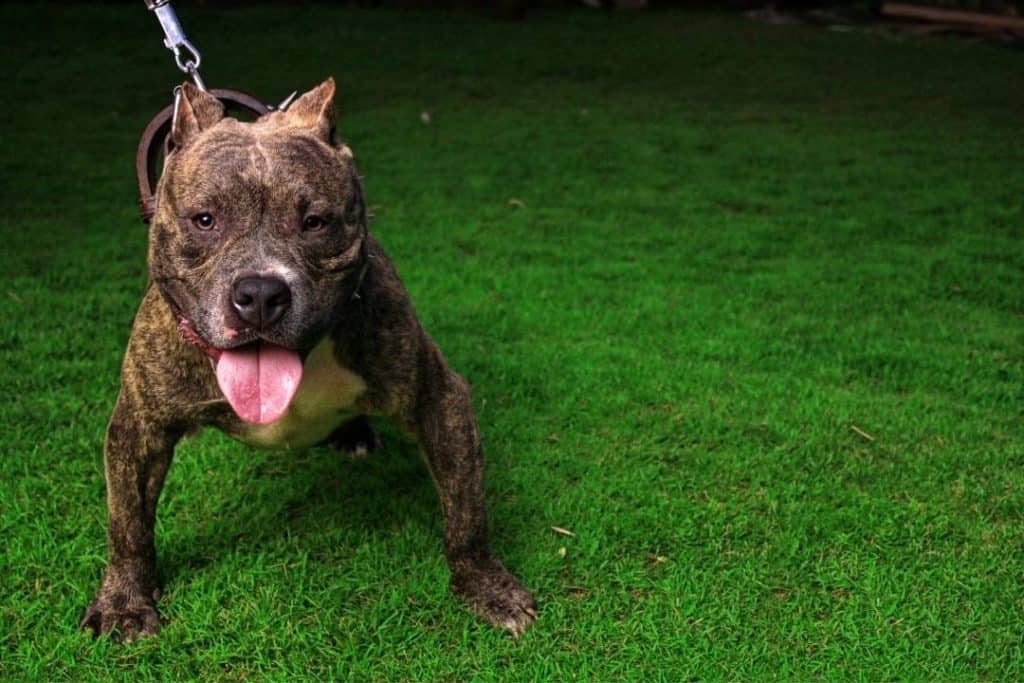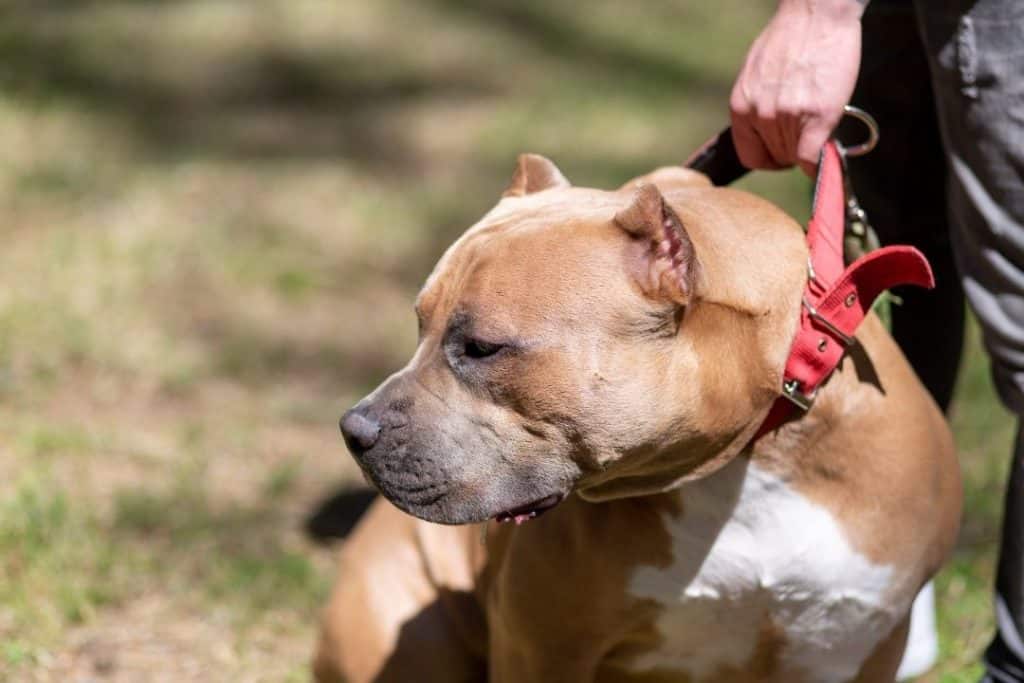This article may contain affiliate links, and I will be compensated if you make a purchase after clicking on my links (at no additional cost to you)
The American Bully is a “bully breed,” all of which share specific characteristics. Unfortunately, many people wrongly assume that these breeds are inherently violent or aggressive.
That’s not true; so what is the American Bully’s temperament like?
The American Bully’s temperament is kind and gentle, and these dogs make for great companion dogs and family pets. That said, the environment a puppy is raised in makes a big difference in temperament, and you should be sure to adopt your pet from a reliable and responsible breeder.
Continue reading to learn more about the American Bully’s temperament and different factors that can affect it.
What Kind of Temperament Does the American Bully Have?
The American Bully is a gentle and friendly dog that makes a great family pet. Often misunderstood for their name and their powerful and muscular appearance, the American Bully is generally not a dangerous animal. Rather, the Bully was intentionally bred in the 1980s to be a less aggressive version of its relatives.
Temperaments of Other Bully Breed Dogs

Other bully breed dogs like the American Pit Bull Terrier, Staffordshire Terrier, Boston Terrier, Boxer, French Bulldog, and Bullmastiff share certain traits and characteristics despite being distinctly different breeds.
In the 1800s, these dogs were bred to be aggressive fighters for dog fighting and bull baiting competitions. Still, they’ve changed in temperament over the last few generations, thanks to responsible breeders. They’ve now become loyal, fun-loving and affectionate, and make great companion dogs.
That said, some factors can trigger predatory behavior in bullies, like fast-moving small animals and joggers that remind them of prey. Socialization at a young age can minimize the risk of aggression in these cases, but it’s something to be aware of as a Bully owner.
Bully breeds are also athletic and intelligent, so they make great working or sporting dogs, too. Bullies are even trained for bomb and drug detection, search and rescue, or therapy.
Some bully breeds are naturally less social than others, but this isn’t to say that they’re “dangerous.” Some are simply more likely to enjoy a day at the dog park than others.
Factors That Influence an American Bully’s Temperament
Although it’s possible to characterize different breeds by temperament, these generalizations are based on a few assumptions, like:
- The dog is healthy
- The dog is brought up in a safe and friendly environment
- The dog has all of its needs met
However, temperament can also differ between members of the same breed because of genetics. All of the following influences can affect temperament:
Exercise

If your dog isn’t getting exercise, it can become destructive and restless, chewing through household items and playing rough.
They may have trouble sleeping through the night, bark incessantly, or even become sluggish and depressed. For a Bully, enough exercise means 30 to 60 minutes per day.
Genetics
Genetics vary from dog to dog, even within the same breed. Dogs tend to inherit their temperament from their parents, for better or for worse. For this reason, it’s essential to go to a reputable breeder who can speak to the dog’s temperament, and if possible, allow you to meet the dog’s parents.
Early Upbringing
If a puppy is born into a large litter, it may have received less attention from its mother at an early age and may have missed certain lessons, like learning not to bite at other dogs and people. A puppy taken away from its mother before about the 8-week mark is more likely to misbehave.
A puppy also needs to be socialized properly through the first four months of life, or they can undergo permanent changes in temperament. Dogs learn from their environment, and it’s a good idea to expose them to lots of people, pets, places, and noises during this crucial time so that they aren’t fearful of them later.
Health
If your dog becomes aggressive, an underlying health problem may be causing distress. Low thyroid levels and pain can both cause extra grumpiness and angry behavior. Some medications can also have this effect. For these reasons alone, it’s important to consult a veterinarian if you notice this kind of behavioral change.
Note: This is purely informational and not veterinary advice. Please consult a veterinarian if you have questions or concerns about your dog’s health or temperament.
Physical Environment
The physical environment that a puppy is raised in has a significant effect on its temperament later in life. And, the physical environment a dog lives in can continue to impact this later on, too. For example, dark garages and other places with low sensory stimulation can cause distress or boredom, negatively impacting the dog’s personality.
Kindness vs. Abuse
A dog that’s yelled at, hit, or otherwise abused by its owner is likely to develop a negative temperament and become unwilling to befriend humans or other animals. And by contrast, a dog treated with love and kindness may be naturally friendly to humans, even if it’s not in the breed.
Dogs for Kids
Dogs can be great companions for kids, in general, teaching them how to be responsible and compassionate for another creature. They’re also great to play with and can keep your kids active. However, different breeds make for better family pets than others. The best family pets are dogs with a gentle and friendly temperament.
Besides the American Bully, the following breeds are great dogs for kids:
- Bernese Mountain Dog
- Cavalier King Charles Spaniel
- American Bully
- Labrador Retriever
- Boston Terrier
- Alaskan Malamute
- Pug
- Bulldog
- Golden Retriever
- French Bulldog
- Irish Setter
- Beagle
- Collie
- Newfoundland
- Brussels Griffon
- Bichon Frise
- Poodle
- Soft Coated Wheaten Terrier
- Cocker Spaniel
- Vizsla
Remember that any dog can have a friendly temperament if they’re healthy and have a happy early upbringing. A mixed-breed dog can make a great family pet, too, and many need homes.
It’s also important to train your dog because they learn from you what kinds of behaviors are acceptable and which aren’t. Training with rewards like treats is an effective way to stop behaviors that you don’t want and to encourage obedience when necessary. You can even hire professional dog trainers for help with obedience training, if necessary, or take a class.
Guard Dogs
A good guard dog is fierce, brave, loyal to its owner, and able to read situations well, knowing when to be protective and when to stand down. Although they sometimes earn a bad reputation, a good guard dog can make a great companion pet as well as a great protector.
American Bullies are not typical guard dogs, but you can train them to be protective.
But if you want a breed known for its guarding and protective traits, look at these breeds:
- Australian Shepherd
- Appenzeller Sennenhund
- Akita
- Catahoula Leopard Dog
- Bullmastiff
- Doberman Pinscher
- Chesapeake Bay Retrievers
- German Shepherd
- Estrela Mountain Dogs
- Caucasian Shepherd Dog
- Romanian Mioritic Shepherd Dog
- Puli
- Giant Schnauzer
- Staffordshire Bull Terrier
- Rottweiler
Like family dogs, guard dogs need to be trained and taught to respect and be friendly to the people in the right contexts. Ensure that your guard dog feels loved and is well-socialized if you want them to be a loyal and loving protector.
Training a guard dog is similar to training a family dog, except that you’ll choose different behaviors to reinforce. You may encourage your dog to bark on command or to bark at strangers, using the help of a friend. But remember to teach your dog to back down on command as well.
Conclusion
American Bullies are gentle and loving dogs, but no two are the same due to genetics and environmental factors. By choosing a dog from a responsible breeder and giving them a warm and loving environment where you can meet their needs, you can guarantee a positive temperament.
Sources
- United Kennel Club: American Bully
- Rover: The Dog People: 8 Signs That Your Dog Isn’t Getting Enough Exercise
- The Marin Humane Society: Bully Breeds
- Good Housekeeping: The 20 Best Dogs for Kids and Families to Adopt Straight Away

I created this blog to share my passion for bullies, and help current and future pitbull owners with things like diet and education.
Hope you find it useful, don’t hesitate to drop a comment on my articles!



